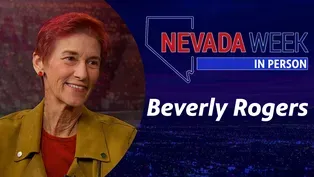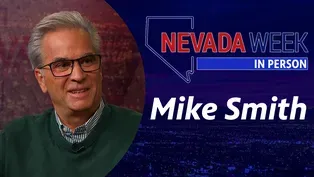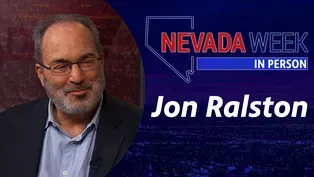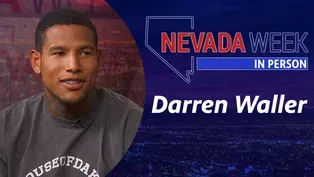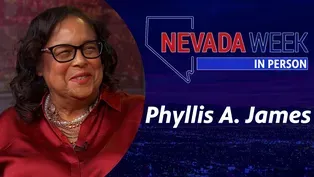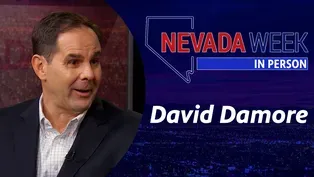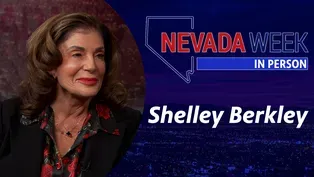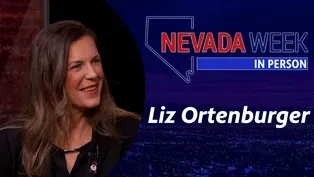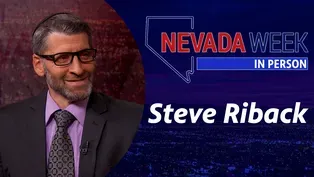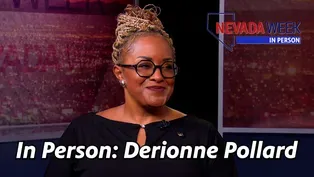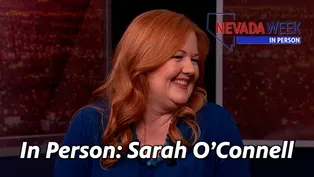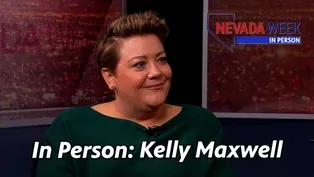
Nevada Week In Person | Tina Quigley
Season 1 Episode 26 | 14mVideo has Closed Captions
One-on-one with new president and CEO of the LVGEA Tina Quigley.
One-on-one with the new president and CEO of the LVGEA Tina Quigley.
Problems with Closed Captions? Closed Captioning Feedback
Problems with Closed Captions? Closed Captioning Feedback
Nevada Week In Person is a local public television program presented by Vegas PBS

Nevada Week In Person | Tina Quigley
Season 1 Episode 26 | 14mVideo has Closed Captions
One-on-one with the new president and CEO of the LVGEA Tina Quigley.
Problems with Closed Captions? Closed Captioning Feedback
How to Watch Nevada Week In Person
Nevada Week In Person is available to stream on pbs.org and the free PBS App, available on iPhone, Apple TV, Android TV, Android smartphones, Amazon Fire TV, Amazon Fire Tablet, Roku, Samsung Smart TV, and Vizio.
Providing Support for PBS.org
Learn Moreabout PBS online sponsorshipMore from This Collection
Nevada Week In Person | Beverly Rogers
Video has Closed Captions
One-on-one interview with Rogers Foundation chair Beverly Rogers. (14m)
Nevada Week In Person | Mike Smith
Video has Closed Captions
One-on-one interview with Las Vegas Sun political cartoonist Mike Smith. (14m)
Nevada Week In Person | Jon Ralston
Video has Closed Captions
One-on-one interview with The Nevada Independent CEO Jon Ralston. (14m)
Nevada Week In Person | Darren Waller
Video has Closed Captions
One-on-one interview with Las Vegas Raider tight end Darren Waller. (14m)
Nevada Week In Person | Phyllis A. James
Video has Closed Captions
One-on-one interview Phyllis A. James. (14m)
Nevada Week In Person | David Damore
Video has Closed Captions
One-on-one interview with Chair of the Department of Political Science at UNLV David Damor (14m)
Nevada Week In Person | Shelley Berkley
Video has Closed Captions
One-on-one interview Senior Vice President for Touro University Shelley Berkley. (14m)
Nevada Week In Person | Liz Ortenburger
Video has Closed Captions
One-on-one interview with SafeNest CEO Liz Ortenburger. (14m)
Nevada Week In Person | Steve Riback
Video has Closed Captions
One-on-one interview with Las Vegas Metro Police Lieutenant Steve Riback. (14m)
Nevada Week In Person | DeRionne Pollard
Video has Closed Captions
One-on-one interview Nevada State College President DeRionne Pollard. (14m)
Nevada Week In Person | Sarah O’Connell
Video has Closed Captions
One-on-one interview with Director of Eat More Art LLC Sarah O’Connell. (14m)
Nevada Week In Person | Kelly Maxwell
Video has Closed Captions
One-on-one interview with Baby’s Bounty Executive Director Kelly Maxwell. (14m)
Providing Support for PBS.org
Learn Moreabout PBS online sponsorshipFor 14 years Tina Quigley worked to improve traffic and transportation in Southern Nevada.
Now she's tasked with bringing new business to the region.
Tina Quigley joins us this week for Nevada Week In Person.
♪♪♪ Support for Nevada Week In Person is provided by Senator William H. Hernstadt and additional supporting sponsors.
Welcome to Nevada Week In Person; I'm Amber Renee Dixon.
In February the Las Vegas Global Economic Alliance named Tina Quigley its new president and CEO but she is far from new to Southern Nevada, having led the all-important Regional Transportation Commission for nine years.
Tina, welcome.
-Thank you.
-Tell me, where are you from originally and what brought you to Las Vegas?
(Tina Quigley) Okay, and I think we all have a very similar story, so you're probably going to align with it.
So I'm originally from Northern California, a little town called Petaluma in Sonoma County.
I went to school in Arizona.
My degree program was in airport development.
I came out in between my junior and senior year of college to earn college credits while I was working at McCarran Airport.
I remember leaving after that experience thinking, driving home in my little Toyota Corolla, you know, with no air-conditioning, thinking I'm so glad to have had that experience on my resume, but I know a couple things.
One, I don't want to go back to Las Vegas.
I just didn't feel a connection with the city.
And two, I didn't want to be a government employee, and I didn't want a desk job.
Then I graduated and McCarran Airport had made a generous offer to come back as a full-time intern.
So I thought well, I can go back for just a couple years.
So I was one of those people who said "just a couple years," and then I'm going to move to Utopia USA, right, and live a beautiful life.
-Which was where did you think that was?
-I didn't know where that was yet.
Anyway, it turns out that there was-- this was early '90s-- so much opportunity and optimism through the '90s and the 2000s, early 2000s, that I think hundreds of thousands of us came here thinking "just two years."
But we got exposed to projects and a culture that was just filled with again opportunity and an excitement that it really made it hard to leave.
-So your job now is regional economic development, and you are tasked with convincing some of those people who have businesses, you can connect to Las Vegas.
We're going to talk more about that, but your degree in aviation business, airport business, I find it kind of wild.
-Did you even know there was such a thing?
-Were you a little girl playing with planes and idolizing Amelia Earhart?
-I was, I did.
I wanted to be a pilot actually, and I did get my private pilot's license when I was young.
But it was real tough at the time.
It's very expensive to get all your ratings to become a pilot.
I was at an aviation school, and I started realizing that maybe I was going to be more honed towards the business aspect of airport and airport development, so I switched degrees.
-Okay.
So you got the job at now Harry Reid International Airport, -Yes, it was McCarran and it's now Harry Reid.
-It's hard, because it was for so many years.
You oversaw a $1 billion capital expansion program, I believe that was the D gate satellite concourse.
-So the D gates was part of it, but we also had runways and taxiways and a garage associated with that project.
So again I was young but I had great mentors and leaders at the airport, and that's that optimism I'm talking about.
There was so much opportunity for career growth and to get involved in projects you otherwise wouldn't have had you been in any other community.
And again I know I've talked to so many hundreds of thousands of people I know they moved here, same thing, their careers, and there are opportunities to get involved in the community and do things that was unparalleled with other communities.
-What do you think it is about Las Vegas that has those opportunities you're talking about that other places don't?
-So at the time we were growing significantly.
We had just in the early '90s the Mirage had opened, the Strip was reinventing itself, we were imploding things.
Businesses were moving here, people were moving here for jobs, the cost of living was tremendous compared to-- you know, we had wages and cost of living again unparalleled with other regions in the United States.
So a great place to start to set up your career.
-Well, how does it compare to now?
I feel we're kind of in the same situation.
-I would agree with you.
I think that we are at a period where we're starting to recognize-- we'll jump into economic development.
We're starting to realize the importance of growing beyond just gaming and hospitality.
Gaming and hospitality will always be our primary-- I'm going to call it spigot of money that's flowing into our economy's bucket, but growing off of that industry, growing into other industries that are related so advanced manufacturing, providing the resources and supplies for gaming is an industry that we are tapping into.
Sports and entertainment, technology-type businesses, clean energy-type businesses, these are growing and you're starting to feel it.
There is a mass exodus from other states, primarily California, so I do think you're starting to feel this sense of "we can be more" and people wanting to be a part of that "we can be more."
I'm excited to be a part of this next "we can be more" phase.
-Back to the airport.
Since your time there, terminal 3 was established.
I wonder, as you are talking to businesses maybe to relocate if you talk about hey, maybe-- is there a need do you think for the airport to further expand?
-That is so fun to hear you say that.
For it to expand?
Yes, certainly.
Now, they're going to be challenged by some of the land limitations and starting to take a look at a secondary airport down towards Stateline near Sloan or Jean.
But just recently I talked with a couple companies.
When companies do choose to locate here, we'll have a lunch with them welcoming them, and I did hear from two of the companies just recently.
One of the reasons they chose to locate here was because of the Harry Reid International Airport and the fact that they could get to any other market in the United States really easily.
One woman was saying that yes, she had markets-- she was moving her headquarters here but she had markets in other states and she could do day trips to some of these other markets where she wouldn't be able to do that at any of the other locations.
We are very lucky, the fact that we have travel and tourism.
It brings with it frequent air service from all over the United States.
-Let's move to the Regional Transportation Commission of Southern Nevada.
You got that job, and I feel like sometimes in life when we get promotions or different careers, it moves us a little bit away from our passion sometimes.
Was that the case for you, moving from aviation to-- you know, runways to roadways, I guess.
-It wasn't, and I'll tell you why.
And the other thing is I think it's important, and you probably will agree, that we do kind of grow.
Sometimes you have to change your career in order to grow and keep yourself engaged.
So I had a boss, his name was Jacob Snow, at the airport, and he was moving over to the RTC.
He was there for a few years, and he asked if I wanted to come and be deputy.
And I wasn't sure either because I was saying I don't know, roads and buses, but he told a story to me about his vision for what he thought the role of transportation was for a community, and it was a vision where you are truly a part of building a community and allowing people who need access to transportation to get to their jobs, building neighborhoods, what we call "complete streets" where we have roads but we also have landscaping and sidewalks and lighting.
Talking about a traffic management system where we move towards employing technology more and more to read-- instead of just stagnated cycles, pre-programmed cycles of traffic management but moving towards adaptive technologies.
It's really easy to get passionate about that kind of stuff, to feel a part, to recognize the value of transportation in a community as one of the primary infrastructures.
But then to be allowed to think big about what can we do to lead not only our community, our region, but also the nation, and some of the stuff was just too yummy to pass up.
-Well, when you are talking to businesses about the current transportation system, what are you saying?
I imagine there are areas that need improvement.
-Oh, absolutely, and the successor to my position, I left right before COVID and my successor, M.J. Maynard, who's doing a great job, took in.
And I remember telling her, it's such a fun job.
You're going to love it.
You know, basically it's all set up.
We just need some funds to expand.
COVID hit, she had to reduce the number of service hours which means the number of-- reduce the amount of access that our transit riders had to places like their jobs, their church, et cetera.
That was so hard to do.
So is there room for improvement?
Yes, she's still growing the system back to where it needed to be.
There's still funding issues, significant funding issues in order to build a truly robust system that operates frequently in the areas it needs to operate in.
-So what are you telling businesses?
-I will tell-- so when we talk to businesses, actually, believe it or not, we do have a pretty strong transportation infrastructure system as it compares to some of our other Southwestern regions.
We do have one and we do rank high regularly in our transportation.
So when logistics companies consider moving here, of course one of the first things they take a look at is our transit and transportation infrastructure, and it is appealing to them.
Every year Site Selector magazine does a survey where they'll ask their readers, when you're taking a look at sites you want to move to, what are your top things that you look at?
Workforce inevitably is always, always number one, and then rest of the nine will change.
But transportation infrastructure is always in one of those top nine, and we always rank high there.
-I'm going to ask you about workforce, but first real quickly, you left RTC to work with Virgin Trains, who was working on a high-speed rail line from Las Vegas to Southern California.
It's now just Brightline.
Virgin Trains is no longer associated with it.
You'd said you think it really is going to happen.
-I did.
-You still think it's going to happen?
-I still think.
I really do think it's going to happen.
I think that by the year-- COVID set them back as well, but I really think it's not going away, and they have significant plans.
I can't tell you the exact year, but I would imagine within the next-- by 2024 you should be seeing something.
And the other exciting news is that we always like to call it the train to Victorville, and from talking with the people who are still associated with the project, it's not the train to Victorville anymore.
They are taking it all the way down to Rancho Cucamonga and then connecting in with L.A's metro train system so it does become a full, you know, Las Vegas to L.A. system.
So yes, I'm still bullish on that project.
-Okay.
Workforce you said is what businesses look at in a potential city they're going to relocate to.
What are businesses you're speaking with asking about the workforce here and what needs to change here to attract more business?
-So we actually have several workforce development, workforce training efforts, agencies, in the valley.
There is a concerted effort right now to surgically align the needs of industry in different sectors, so advanced manufacturing, manufacturing, healthcare, information and communications technologies, clean energy and identifying existing employers in Southern Nevada and pairing them up with the workforce development groups and our higher ed groups and K-12 representatives and having-- we actually spent half a day together just talking about at a surgical level, what certificates training, et cetera, do you need for the workforce so you can grow and we can bring in new businesses?
And it's the first time that we've ever really had that significant integration of needs and providers aligned, and it'll take a while but in our pipeline, we have a business development group that is having early-on conversations with companies that are scouting out different locations or maybe have decided to move to Southern Nevada and now it's a matter of getting them set up with property, choosing the site, walking them through, and that can take up to 18 months.
But we know those jobs are coming, so we can work with them and again, those higher ed and workforce development providers too, and we have to do that.
I mean, this isn't like an option.
In order for us to stay competitive, it's not about jobs, jobs, jobs anymore.
It's about workers, workers, workers or talent, talent, talent, and that shifts the responsibility of the LVGEA and its partners from just landing jobs here but to creating workers and talent for those jobs that we're going after.
It's really-- I want to keep emphasizing how important that part of economic development is.
-Very quickly, any pushback from the all-powerful casinos?
-You know, not in my tenure.
I know we love to have-- it's urban legend that no, casinos don't want any other industries here.
I don't believe that to be true; in fact, we have four gaming representatives on our board, and they very much want to see the continuation of workforce and diversity so they're not the sole industry responsible all the time for these things.
-Tina Quigley, thank you so much for joining us for Nevada Week In Person.
-Thank you.
-To see this week's edition of Nevada Week, Sunday night at 5:30.
Support for PBS provided by:
Nevada Week In Person is a local public television program presented by Vegas PBS
